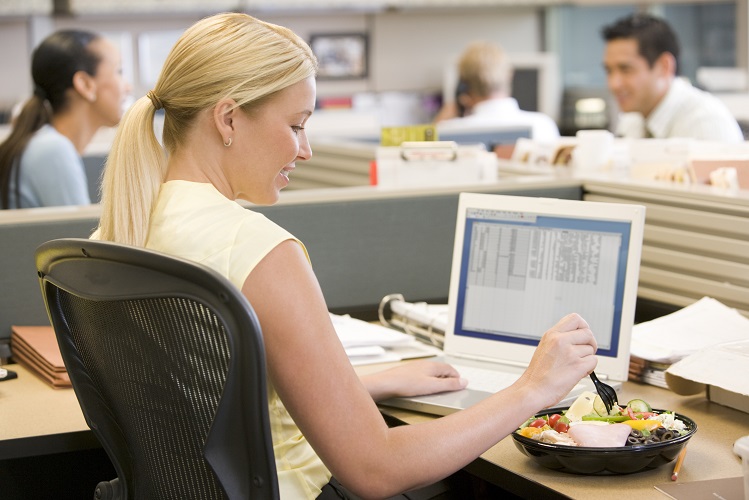 Many workers eat at their desks, whether it’s a full meal (such as lunch), or the odd snack – it has definitely become part of office culture. Some employees even see this as a sign of their “commitment” and, in a recent HR survey, 60% of office workers actually said they would feel “guilty” if they took their allotted hour’s lunch break.
Many workers eat at their desks, whether it’s a full meal (such as lunch), or the odd snack – it has definitely become part of office culture. Some employees even see this as a sign of their “commitment” and, in a recent HR survey, 60% of office workers actually said they would feel “guilty” if they took their allotted hour’s lunch break.
Most of us are quite happy if employees/colleagues eat a sandwich or snack but, with the increasing ease at which fast food can be delivered to the workplace, when does eating at your desk become unacceptable? What can you do when employees eat hot food with a distinct lingering aroma?
Rather than singling out individual employees it makes sense to tackle the issue as a whole and consider introducing either:
- A formal Food Policy
- A less formal agreed “Desk Etiquette” – a list of agreed “acceptable and unacceptable” activities that are determined from open discussion
Why else do this?
Aside from the issue of pungent foods, there are a number of reasons that make a Food Policy or Desk Etiquette a good idea (and useful to bear in mind if challenged by employees) including:
- Health and safety – employers have a duty with regard to a worker’s health and safety which includes ensuring that employees take sufficient breaks
- Working Time legislation – provides for uninterrupted rest breaks for employees which can’t be guaranteed if they are at their desks
- General health benefits of leaving your desk and taking exercise
How to introduce a Food Policy, or agreed “Desk Etiquette
(1) Can you have a designated area?
Dependent on your practice premises, the best option is to consider offering employees an alternative place to eat, such as a break room or a table and chairs in a kitchen area.
Is there any other facility you could share?
(2) Talk to the employees
Before you introduce a policy or make any changes it’s important that you get your employees involved, so raise the issue and ask for everybody’s input. Listen to their ideas and take them into account.
(3) Restrict what can be consumed – but be fair
One obvious step to take is to restrict exactly what can be consumed at the desk but you can’t just single out certain types of food:
- Eating often involves cultural issues so take care that you do not inadvertently discriminate. You can’t “ban” certain pungent foods, but your policy or etiquette may say that only drinks and certain snacks can be consumed at the desk
- Ensure that you take into account the needs of employees who need to snack frequently, because of illness or disability, to avoid discrimination or putting them at a disadvantage
(4) Be clear
Don’t forget that when introducing any policy or rules you need to clarify to your employees what the impact of breaching these would be.
Ultimately, having a considered Food Policy, or “Desk Etiquette”, will make the practice a more pleasant place to work and visit.
—————-
Trending topics in the forum:
Annual leave entitlement
Bank holiday allowance
Advice needed – Upstairs disabled worker access
No personal documents, such as passports, should be scanned?





0 Comments